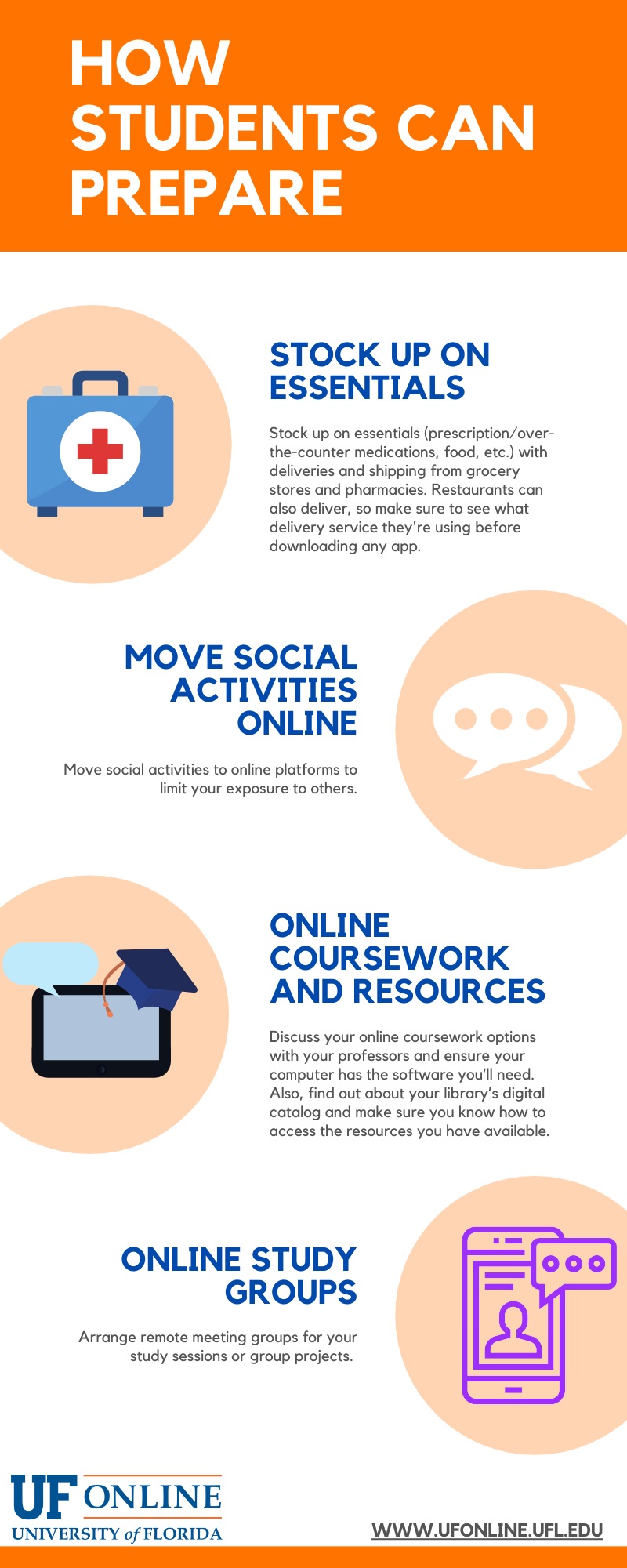The coronavirus (COVID-19) is having a significant impact on universities and colleges across the country. While each school is taking its own precautions to prevent the spread of the virus, many are looking towards online education to continue classes without putting students and faculty at risk. As a leader in online education, UF Online is monitoring the situation and will be providing advice to students on how to best prepare for the transition from a traditional classroom to a digital one.
To get the latest news on how the University of Florida is responding to the novel coronavirus outbreak, visit the university’s Covid-19 update page.
How universities and colleges are responding to coronavirus
U.S. universities and colleges are monitoring coronavirus closely and making plans for how to best keep students and staff healthy without compromising any student’s education. Different solutions are being implemented by the various schools, and universities continue to adapt their strategies based on the needs of health care professionals, students, and staff.
Some solutions that are currently being implemented include:
- Encouraging or requiring faculty move their classes online
- Encouraging or requiring students to vacate dormitories
- Postponing or canceling events that would put students and staff into proximity to each other
- Closing stadiums and gymnasiums to fans
- Canceling study abroad programs
For specific examples of how some schools are responding to the coronavirus:
-
University of Florida
Began by encouraging professors to move courses online. As the situation developed, UF began requiring that professors move classes online until the risk has passed.
-
Harvard University
Transitioned their courses to online only and required that all students (who are able) to not return to campus after Spring Recess. For those students who are unable to relocate, they began to limit campus accessibility/resources to prevent the spread of infection.
-
New York University
Moved all classes online and has encouraged all non-essential employees to work remotely.
Hear UF students’ experience with online learning
What students can do to prepare for coronavirus
The impact of coronavirus on student life cannot be understated. Across the country classes are moving online, events are being canceled, and clubs and social groups are reconsidering meetings and activities. Even many businesses are considering closing their doors or reducing their hours in preparation for the virus.
Online Course Quick TipsWhile these changes have a significant impact on everyone, students are often more heavily affected than other groups for several reasons, including:
- Reliance on public transportation
- Reliance on the food service industry due to limited access to cooking supplies
- Reliance on employment in many of the industries that are most impacted by coronavirus (i.e., food and customer service)
- Increases likelihood of employment that does not include paid sick leave or health insurance
- Limited access to storage spaces for emergency supplies
The most important thing is to ensure you’re able to self-quarantine for approximately two weeks if you begin to suspect infection. However, there are some preparations that students can take to ensure they are better prepared for the coronavirus’s effects on their lives.
- Stock up on essentials (prescription medications, food, and over-the-counter medicine) prior to the virus reaching your area
NOTE: If you are unable to stock up on essentials or your living area is communal, it may be in your best interest to return home if you are able. If you are unable to leave communal housing, be sure to work with your housing administration and resident advisor to ensure precautions are being taken to reduce the risk of infection. - Move social activities to online platforms to limit your exposure to others
- Host a virtual movie night
- Play online video games (even if board games are more your speed, many virtual versions of your favorites likely exist)
- Use virtual meeting software (e.g., Zoom or Discord) to arrange face to face time with peers, classmates, and friends
- Discuss your online coursework options with your professors and ensure your computer has the software you’ll need
- Arrange remote meeting groups for your study sessions or group projects
- Find out about your library’s digital catalog and make sure you know how to access the resources available
If you’re looking to arrange a remote meeting or study group, consider making use of one of the following software applications:

Zoom

Skype

Discord

Hangouts
In addition, some online education platforms include special tools to arrange online meetings and manage group projects. For instance, UF Online includes access to Plaza. Within the Plaza, you are able to receive the latest news about UF, join groups of students based on your location, major or specific classes, and even interest area. UF Online students have the ability to start their own group based on potential connections to other students. You can even customize your news feed to receive the information that is most important to you.
What parents can do to prepare for coronavirus
Outside of the university and college setting, parents are also significantly affected by the newest strain of coronavirus. Between the closing of schools and the shift to alternate work locations, many parents will be changing their schedules significantly in the near future. While these changes can be stressful, they are important to implement to lower the curve of infection and reduce the impact coronavirus has on our communities long term.
For parents of university and college students, we suggest you discuss your plans with your children and encourage them to do the same. For many college students, this will be their first experience making an independent plan for an emergency situation. Having a discussion that focuses on your preparations will serve as a framework for the creation of their plan.
In addition, having answers to the following questions can help ease your mind:
- Are students required to leave the dormitories at this time?
- Do students have access to private bathrooms or other essential spaces?
- Is there a plan in place to check on ill students who may be in shared living situations?
- Is there a plan to continue classes remotely if the university needs to temporarily close traditional classrooms?
How online schools and distance learning are helping prevent coronavirus at universities and colleges
The Center for Disease Control (CDC) and the World Health Organization (WHO) are encouraging communities and individuals to practice social distancing. This means canceling large gatherings (meetings, classes, parties, etc.) and making use of remote options whenever possible. Universities are no exception to this rule, so many are switching to distance learning to abide by these suggestions.
Online education is an excellent alternative to traditional classes because it will allow students to continue their coursework, examinations, and overall education without putting them at risk for infection. In addition, because of advancements in video conferencing software, online education still involves much of the same face-to-face interactions and live lectures that traditional classrooms include.
Tips for studying online from the students and faculty at UF Online
The UF Online community consists of more than 3,500 students who are in online bachelor’s programs, as well as countless faculty who teach online students. We asked what advice they would give to the students who are transitioning to an online classroom and this is what they shared:
Have a dedicated place to study
While an online course schedule brings freedom to study anywhere, online students recommend having a dedicated place in your home to work.
Create a schedule and stay organized
Try to create as much normalcy as possible in your schedule. While you may not be leaving your home to attend class, keeping a routine will help you stay organized.
Do not chain yourself to your computer
Being an online student does not mean you need to sit in front of your computer for countless hours at a time. Just as your in-person courses have set periods and breaks, incorporate those practices in your online studies.
Communicate with your professors
Being a remote student doesn’t mean you can’t interact with your instructors. Attend virtual office hours and send questions via email. Your instructors are still real people, and they want you to succeed and are there to support you!
Stay social
Taking care of yourself also means maintaining a social life. While you may not be socializing as much in-person, be creative in the ways in which you can maintain contact with classmates and friends. Online students frequently meet remotely to study or use social media sites like Snapchat, Facebook, or GroupMe to maintain relationships.

